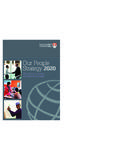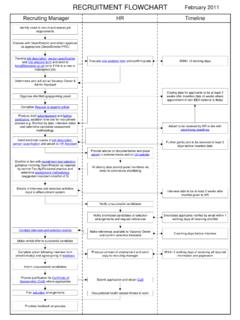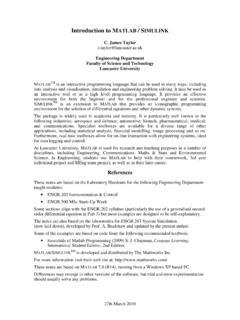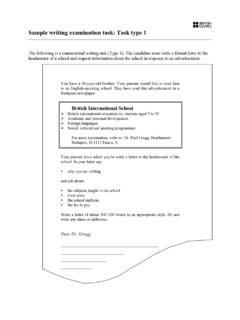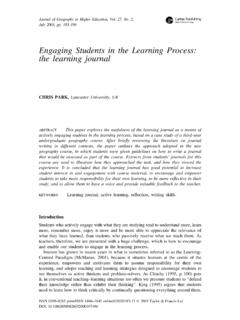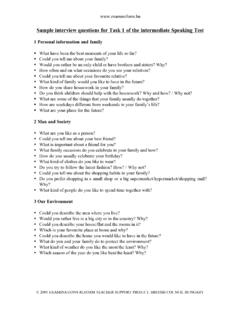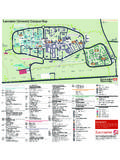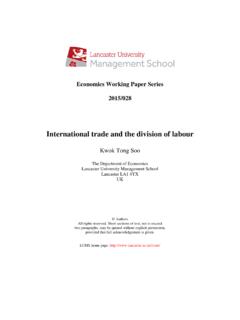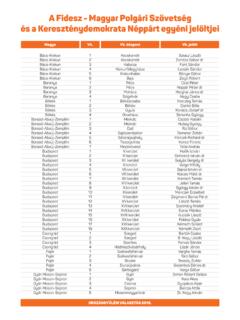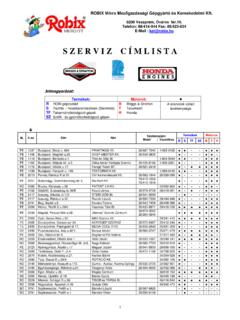Transcription of INTO EUROPE Prepare for Modern English Exams
1 INTO EUROPE . Prepare for Modern English Exams Listening INTO EUROPE . Series editor: J. Charles Alderson Other volumes in this series: Reading and Use of English The Speaking Handbook The Writing Handbook Into EUROPE Prepare for Modern English Exams Listening Katalin Feh rv ryn Horv th Karmen Pi orn CONTENTS. Acknowledgements 7. PART ONE Introduction 13. Chapter 1: To the Teacher and the Student 15. Chapter 2: Listening 19. PART TWO Listening Tasks 29. Chapter 3: Short-answer questions 31. Chapter 4: Multiple-choice tasks 47. Chapter 5: True/false tasks 61. Chapter 6: Completion tasks 71. Chapter 7: Matching tasks 91. PART THREE Answer Keys 103. APPENDICES. 1 Guidelines for Writers of Listening Tasks 115. 2 Contents of the CDs 127. Series Editor's preface Modern EUROPE encourages mobility of labour and of students across the frontiers of the European Union and beyond. In order to be able to take up study places or work opportunities, knowledge of a foreign language is essential.
2 In the Modern EUROPE , it is increasingly important not only to be able to use a foreign language, especially a widespread and widely learned language like English , but also to be able to prove that one can use the language at the level required by employers, schools, universities or other agencies. And that means passing a recognised, valid examination which offers certificates in a foreign language. The 'Into EUROPE ' series is intended to provide teachers and learners alike with opportunities to Prepare to pass Modern European examinations of English . The series originated in a British-Council-funded project spanning some seven years, which initially developed communicative, skill-based test tasks to contribute to the reform of English school-leaving examinations in Hungary. Recently the Council decided to make these tasks and associated guidelines and advice more widely available, in order to help teachers and students understand the levels and demands of Modern European Exams .
3 This book is the fourth in the series, and it focusses on the ability to understand spoken English , as tested by tests of Listening. The book will help teachers and their students to improve their listening abilities in English , in order not only to Prepare for Modern European examinations, but also to use English in real life. The abiliy to understand people speaking in a foreign language is an essential skill in the Modern world, but it is frequently neglected in language classrooms, and it is certainly one of the most difficult abilities to develop. Yet Modern European language examinations always include a section that assesses how well learners can understand the spoken language, and so it is very important that teachers and learners pay more attention to this neglected skill. We believe that this book will help considerably in this regard. Unlike more traditional tests, Modern European examinations present listening tests based on authentic texts recorded from real life.
4 Therefore this volume also presents a wide variety of different texts and listening tasks which reflect the sort of things that learners may encounter on such tests. The book is accompanied by two CDs containing the texts on which the tests in this book are based. All too often, textbooks purporting to teach listening provide transcripts of the spoken texts. The authors of this book do not do this, since they believe that 8 INTO EUROPE Listening the best way to develop learners' listening abilities is to get them to listen, not to read the texts. The more students can hear authentic English , the easier it will be for them to understand what speakers are saying, and the easier it will be for them to pass a listening test. The practice tasks included in this book were developed in accordance with Modern European testing practice by item writers trained in Modern testing techniques. The items went through a process of quality control, which involved reviewing, revising, piloting, analysing and revising the tasks.
5 It also involved a rigorous standard-setting process where experts in English language education and assessment gave their professional judgements as to the level of the texts according to the levels of the Common European Framework, on which many Modern European examinations are now based. The authors of this book have been involved in language testing and assessment for a considerable time. They both have extensive experience of developing tests in their respective contexts, in Hungary and Slovenia. This book is the result of collaboration between the British Council in Hungary and the British Council in Slovenia, who decided to pool their expertise in order to make these tasks available to a wider audience. Language teachers who have to test their students' listening abilities and those who wish to Prepare their students for Modern English examinations will both find this book a valuable resource. Acknowledgements We were privileged to work with Prof.
6 Charles Alderson, our Series Editor, to whom we would like to express our profound gratitude. Without his guidance and me- ticulous attention to detail, this volume would not have been published in its cur- rent state. From the inception of the Project, Charles has provided eminently helpful advice on everything from test development to statistical analysis. His faith in us and his ability to bring us back on track at difficult times have been invaluable. He has taught us that quality in testing is not a term we may play with in any way we like. His professionalism has set a great example for all the Project members to follow. Charles is not only our mentor, supervisor and consultant but also a colleague and a friend. Thank you! Our heartfelt appreciation goes to Edit Nagy, our Project Manager, the originator of the British Council's support to Examination Reform in Hungary. Without Edit the Project would never have started and would never have been completed.
7 For your inestimable support and continuous encouragement, and your careful and wise guidance throughout the creation of the Into EUROPE series, we cannot thank you enough. We would particularly like to thank M ria Csereszny s, the consultant to this volume, for her tremendously useful comments on the texts and the tasks themselves. Offering timely feedback, she has made invaluable contributions to the development of our ideas and the organisation of the book as a whole. Cseri, we are grateful that you were ready to share with us your deep understanding of language assessment in general and test construction in particular. We are very happy to acknowledge the support of K OKSZI, most especially of Krisztina Szoll s, who promoted the cause of quality exam reform when we seemed to have more opponents than friends. We are extremely grateful to the British Council Hungary for its unfaltering support over the years, especially the support of Directors Paul Dick, John Richards and Jim McGrath and their able Assistant Directors Ian Marvin, Peter Brown, Nigel Bellingham and Paul Clementson.
8 We have counted on and benefitted enormously from your support in good times and in bad. We would also like to acknowledge the support of the British Council Slovenia and are especially grateful to Danila Beloglavec, ELT Project Manager for her un- derstanding of our needs for training in testing and to Steve Green, the ex- director of the British Council Slovenia for his unhesitating support throughout the Nine-Year External Examinations Project. 10 INTO EUROPE Listening We wish to thank J zsef Farkash zi, our sound engineer, for the professionalism and good spirit he radiated throughout the studio recording and the production of the sound tracks. We are extremely grateful to Zsuzsanna Nyir , who organ- ised the studio recording events, and whose patience and positive attitude were felt during the long studio hours. We would also like to acknowledge the fruitful cooperation of those people who have lent their voices to the tasks: Ashley Brees, Andrew Reid, Louise Petri, Irina Tapolcai, Mark Gilbert, Kate Masters, Josh Masters, Nigel Greer, Sonia Bullivant-Pawson, Nic Bullivant-Pawson and Michael Hughes thank you all.
9 Many thanks go to Chris White who has kindly written a number of tapescripts for the tasks. We are also very happy to acknowledge the support of Dezs Gregus of the DZ Studio, the CD production manager, whose dedication and flexibility have always been appreciated. To our layout editor Rita R v sz, thank you for your professional contribution to the nice look of this volume. Without a committed publisher, a book cannot appear. We are privileged to have had the support of the Teleki Foundation, its manager B la Barab s, and his assistant Calligalisn Bocs rdy Gy rgyi. Pilot data management and statistical analyses were professionally produced by Lud nyi Zsuzsa, Himmer va and Szab G bor. Thank you very much for your contribution. We also acknowledge gratefully the support of our consultants, listed below, without whose expertise, experience and encouragement, we would not have got as far as we have. Without the enthusiastic participation of countless secondary school teachers and their principals and students, we would not have been able to pilot and improve these test tasks: to you, we owe a great deal.
10 And finally to you, the reader and the listener, thank you for using this book and we hope you enjoy and benefit from the results. There are so many more people who have helped us on the way to this publication that we are not able to mention all. However, below we list those individuals who have written items, attended training courses, taken part in Editing Committee meetings, designed teacher-support materials and courses, benchmarked and standard-set, and who did other multi-faceted tasks in the examination construction process. PEOPLE AND INSTITUTIONS. British Council Project Manager Nagy Edit 11. K OKSZI Project Manager Szoll s Krisztina Item writers and test developers, who took part in the development of the examination model, item production, standard setting and benchmarking Szab G bor, Barta va, Feh rv ryn Horv th Katalin, Csereszny s M ria, Sulyok Andrea, Szab Kinga, Martsa S ndorn , Szoll s Krisztina, Horv th J zsef, Gr f Szilvia, Schultheisz Olga, Weltler Csilla, S ndor Ern n , Tank Gyula, Hegyk zi Zsuzsanna, brah m K rolyn , Bukta Katalin, Cs pes Ildik , Grezsu Katalin, Csol kn Bogn r Judit, Magyar Mikl sn , Hardien Moln r Erika, G l Ildik , P rcsich Rich rd, Dr Kiss Istv nn , Egy d J.
